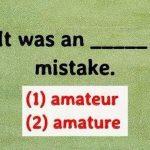You have to get at least 29/32 correctly in order to get an ‘A+’ in this spelling quiz.94% Of Americans Can’t Spell The Most Confusing 32 Words. Can You?
Quiz: 94% Of Americans Can’t Spell The Most Confusing 32 Words. Can You?
Are you ready to put your mental agility to the test? This quiz is designed to challenge even the most brilliant minds out there. If you can score 15/15, you can proudly say that you have a PhD in mental agility.
The questions in this quiz are not your typical multiple-choice questions. They require you to think outside the box and use your problem-solving skills to come up with the correct answer. You will need to be quick on your feet and have a sharp mind to ace this test.
Don't be discouraged if you don't get all the answers right on your first try. This quiz is meant to be difficult, and it's okay to take your time and think through each question carefully. Remember, mental agility is not just about speed, but also about accuracy and precision.
So, are you up for the challenge? Take this impossible mental agility test and see if you have what it takes to earn a PhD in mental agility.





